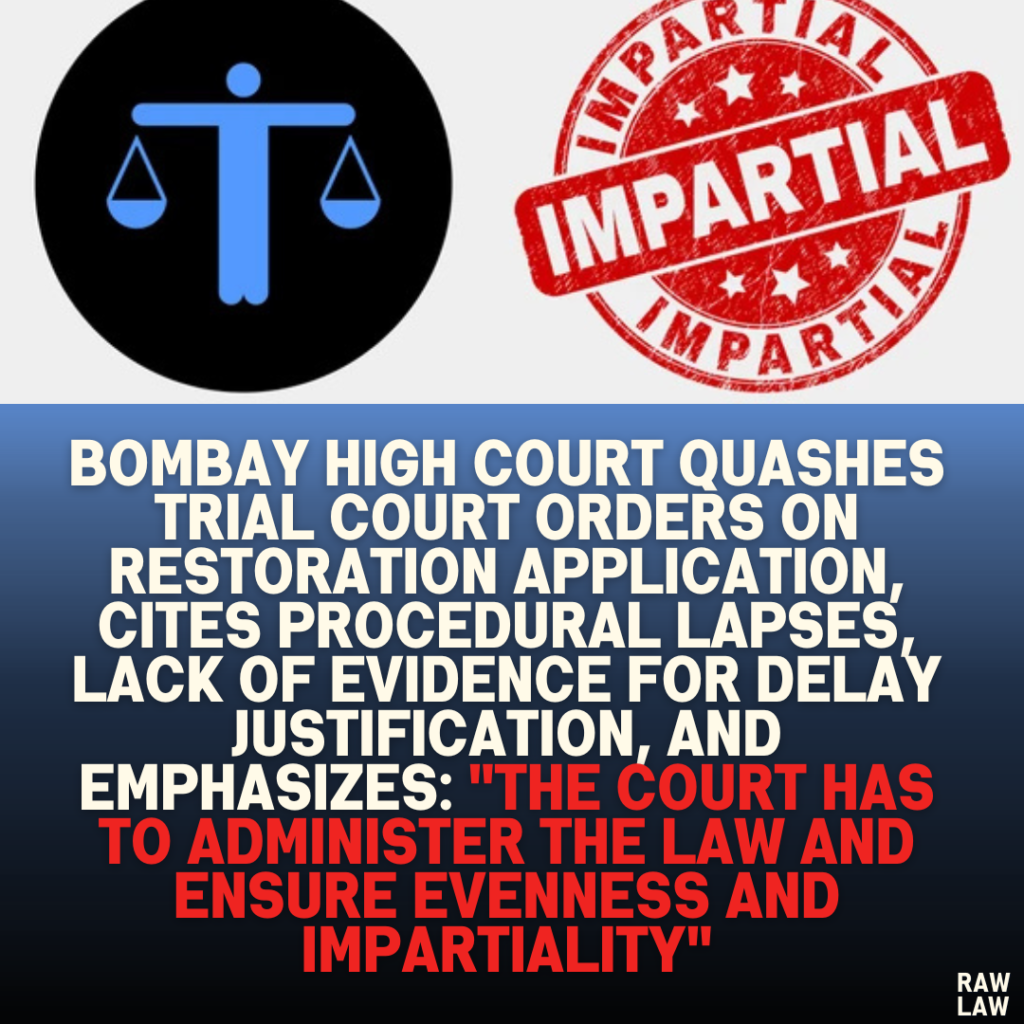Court’s Decision
The Bombay High Court quashed the trial court’s orders dated 04/10/2021 and 20/10/2021 passed in MJC No. 196/2021. It directed the trial court to:
- Allow both parties to lead evidence on the issues of delay and restoration.
- Properly register the restoration application separately.
- Issue notices to the petitioner, giving them the opportunity to participate.
- Dispose of the matter within two months of condoning the delay, and separately dispose of the restoration application within two months thereafter.
- Maintain the status quo until further orders.
Facts
- The original suit, Special Civil Suit No. 956/2011, was dismissed in default on 31/01/2017 due to the plaintiff’s absence.
- The applicant (respondent in this petition) claimed they were unaware of the dismissal because their advocate failed to inform them.
- In September 2020, the applicant discovered the dismissal and filed a restoration application in MJC No. 196/2021, along with a delay condonation application.
- The applicant cited health issues (physical disability and a major heart surgery) and disruptions caused by the COVID-19 pandemic as reasons for the delay in filing the restoration application.
- The trial court condoned the delay and restored the suit but failed to follow procedural requirements, such as separate registration of the restoration application and issuing notices to the opposing party.
Issues
- Did the trial court err in condoning the delay without requiring proper evidence from the applicant?
- Did the trial court violate procedural norms by failing to register the restoration application separately and not issuing notices to the petitioner?
- Was the applicant’s explanation for the delay reasonable and substantiated?
Petitioner’s Arguments
The petitioner (opponent of the restoration application) argued:
- The delay in filing the restoration application was excessive, spanning 1473 days, even after deducting the COVID-19 pandemic period.
- The applicant failed to produce evidence to justify the delay, particularly regarding alleged non-intimation by their counsel and their health issues.
- The trial court erred by condoning the delay and restoring the suit without issuing notices to the petitioner or allowing them to contest the application.
Respondent’s Arguments
The applicant (respondent in this petition) contended:
- They were unaware of the suit’s dismissal due to non-intimation by their counsel.
- Personal health issues (physical disability and heart surgery) and the COVID-19 pandemic caused delays in taking action.
- Their delay was unintentional and bona fide, warranting condonation.
Analysis of the Law
The High Court analyzed the procedural and substantive aspects:
- Procedural Irregularities:
- Restoration applications must be registered separately to ensure clarity and proper notice to all parties.
- The trial court’s failure to issue notices deprived the petitioner of their right to oppose the restoration application.
- Evidence Requirement:
- The applicant did not lead evidence to substantiate their claims of delay, such as providing proof of non-intimation by their counsel or medical records for health issues.
- Without evidence, the court cannot presume the validity of the applicant’s claims.
- Role of Courts:
- The court must ensure fairness and impartiality by allowing all parties to contest and present their cases.
- Procedural lapses, like failing to issue notices or register applications separately, undermine the principles of justice.
Precedent Analysis
Although no specific judgments were cited, the High Court reiterated established principles of procedural fairness, ensuring:
- All parties receive due notice and an opportunity to contest.
- Evidence is required to substantiate claims of delay or procedural default.
Court’s Reasoning
- Failure to Follow Procedure:
- The restoration application was not registered separately, leading to confusion and procedural gaps.
- The trial court passed restoration orders without notifying the petitioner, depriving them of the opportunity to oppose.
- Delay Justification:
- The applicant did not lead evidence to prove the alleged reasons for delay, such as non-intimation by their counsel or health issues.
- The significant delay of nearly 3 years and 10 months was unjustified without proper evidence.
- Judicial Responsibility:
- Courts must ensure procedural compliance and impartiality in adjudication.
- Procedural lapses, such as failing to issue notices, compromise the fairness of the process.
Conclusion
The High Court quashed the trial court’s orders, emphasizing the importance of:
- Adherence to procedural norms.
- Allowing both parties to lead evidence.
- Granting the petitioner an opportunity to contest the restoration application.
The trial court was directed to:
- Dispose of the matter expeditiously, within two months of condoning the delay, and separately register and decide the restoration application.
Implications
The judgment reinforces:
- The importance of procedural fairness in civil litigation.
- The necessity of substantiating claims with evidence, especially in cases involving significant delays.
- The obligation of courts to ensure equal opportunity for all parties to present their case.
This ruling sets a precedent for strict adherence to procedural norms in restoration applications, ensuring transparency and fairness in judicial processes.




Pingback: Delhi High Court Grants Bail to Accused After 11 Years of Incarceration Under UAPA, Balancing Prolonged Custody, Delayed Proceedings, and Constitutional Rights to Liberty and Speedy Trial - Raw Law